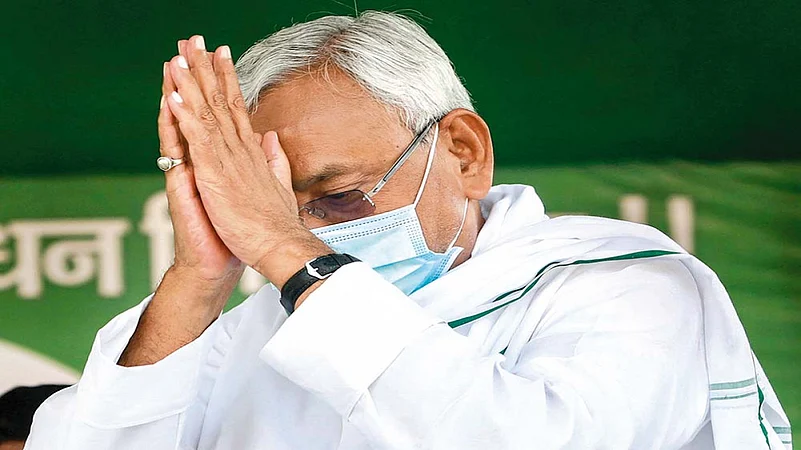Nitish Kumar is up against a belligerent Opposition breathing down his neck right from the word go in his fourth term as Bihar CM—an unusual situation given the docile role his rivals played earlier. In his first term, Nitish took the initiative to set up a fast-track court for cases against bahubali politicians and enacted a law to confiscate the property of officials facing corruption charges—houses of a former Bihar DGP and a secretary-level IAS officer were confiscated and converted into schools. While such initiatives earned Nitish the moniker of Sushashan Babu, or Mr Good Governance, he recently had a torrid time in getting a new bill—the Bihar Special Armed Police Bill 2021—passed during the budget session of the Vidhan Sabha.
Led by RJD leader Tejashwi Prasad Yadav, the Opposition dubbed it a “black law” that would enable the Special Armed Police Force to arrest anybody without a warrant on the basis of suspicion. As Tejashwi put it, the law would empower police to imprison a citizen merely on the basis of “belief”. It led to unprecedented bedlam in the assembly, as opposition members did not allow the Speaker to come out of his chamber to conduct the proceedings. Inside, mikes were broken and chairs and tables were turned upside down. Police were finally called inside the House to evict the opposition members. Several videos of the ugly episode that surfaced later showed security personnel manhandling some legislators. The bill was passed later in the night, with the Opposition boycotting the House.
Nitish said he had never seen such scenes inside the House since he became an MLA for the first time in 1985. “I have been in the government in Bihar for four terms, but never have I seen such a scene in the House. It was sad,” he said. Tejashwi, however, accuses Nitish of introducing a law that was first brought during British rule. “Police were called inside the temple of democracy and women legislators were dragged by the hair. Male legislators were beaten, kicked and punched. It was all done on the instructions of the state government,” the RJD leader alleged.
The government reiterated that the new law has been introduced only for the protection of important establishments and its provisions would not apply to the general police. Referring to the 2013 terrorist attack on the historic Bodh Gaya temple, Nitish wondered whether the security personnel deployed there would wait for a warrant to arrest if someone started firing.
It is not the first time the Nitish government got embroiled in a controversy over its laws. In February, Bihar Police issued a circular stating that anybody arrested for a “criminal act” such as protests would not be able to get a government job or bank loan. In January, another circular issued by Bihar Police warned of legal action against posting any offensive or misleading social media posts against ministers, MPs, MLAs or officials. These steps left Nitish facing volleys of criticism.


























